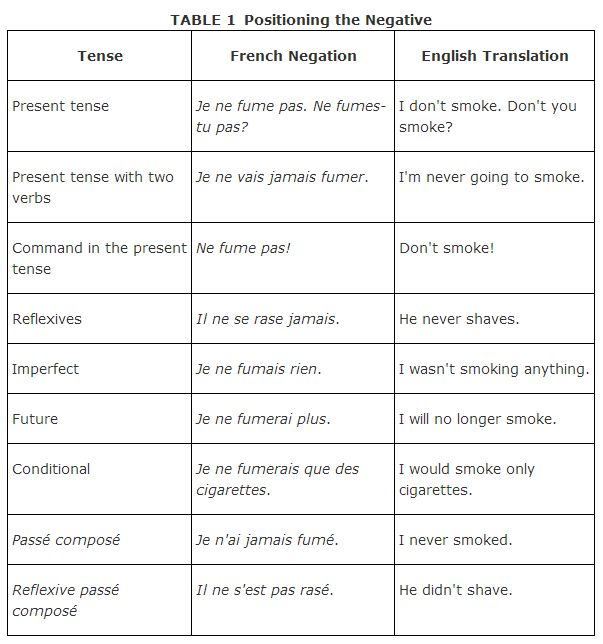In simple tenses (present, imperfect, future, conditional) and in the compound past tense (le passé composé), ne precedes the conjugated verb (the conjugated form of avoir or être in the passé composé), and any pronouns, including reflexive pronouns. The second part of the negative follows the conjugated verb (or follows the subject pronoun in an inverted question). Table 1 illustrates how this is done.

Consider the following rules regarding the formation of negatives:
- Ne + the negative goes around the conjugated verb when it is followed by an infinitive.
- Elle ne veut plus jouer. (She doesn't want to play anymore.)
- Il ne peut pas sortir. (He can't go out.)
- Personne follows the past participle and the infinitive:
- Il n'a vu personne. (He didn't see anyone.)
- Je ne veux voir personne. (I don't want to see anyone.)
- Que precedes the word or words stressed.
- Il ne mange que deux fois par jour. (He eats only two times a day.)
- Elle n'a acheté qu'une robe. (She bought only one dress.)
- Je ne vais le faire qu'une fois. (I'm going to do it only once.)
- Each part of the ne … ni … ni construction precedes the word or words stressed.
- Nous ne mangeons ni viande ni poisson. (We eat neither meat nor fish.)
- Le cours n'était ni bon ni mauvais. (The course was neither good nor bad.)
- Il n'a ni étudié ni fait ses devoirs. (He neither studied nor did his homework.)
- Rien and personne may be used as subjects of a verb, but ne remains before the conjugated verb.
- Rien n'est arrivé. (Nothing happened.)
- Personne n'est arrivé. (Nobody arrived.)
- Ne is always used with a verb. The second part of the negative, however, may be used alone (without ne), but pas and plus must be modified.
- Qu'est‐ce que tu manges? (What are you eating?) Rien. (Nothing.)
- Qui chante? (Who's singing?) Personne. (No one.)
- Tu aimes le film? (Do you like the film?) Pas beaucoup. Not much.
- Plus de gâteau pour toi. (No more cake for you.)
- Ne … jamais used with a verb and jamais used alone without a verb mean never. Jamais with only a verb means ever.
- Je n'ai jamais vu ce film. (I never saw that film.) Non, jamais! (No, never!)
- Es‐tu jamais allé au Canada? (Have you ever been to Canada?)